The National Oceanographic Data Center (NODC) was one of the national environmental data centers operated by the National Oceanic and Atmospheric Administration (NOAA) of the U.S. Department of Commerce. The main NODC facility was located in Silver Spring, Maryland and was made up of five divisions. The NODC also had field offices collocated with major government or academic oceanographic laboratories in Stennis Space Center, MS; Miami, FL; La Jolla, San Diego, California; Seattle, WA; Austin, Texas; Charleston, South Carolina; Norfolk, Virginia; and Honolulu, Hawaii. In 2015, NODC was merged with the National Climatic Data Center and the National Geophysical Data Center into the National Centers for Environmental Information (NCEI).
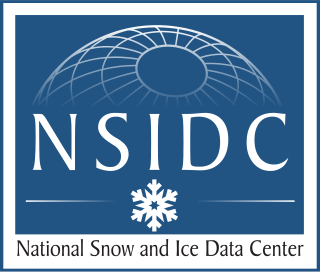
The National Snow and Ice Data Center (NSIDC) is a United States information and referral center in support of polar and cryospheric research. NSIDC archives and distributes digital and analog snow and ice data and also maintains information about snow cover, avalanches, glaciers, ice sheets, freshwater ice, sea ice, ground ice, permafrost, atmospheric ice, paleoglaciology, and ice cores.
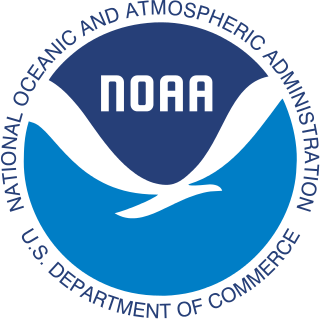
Oceanic and Atmospheric Research (OAR) is a division of the National Oceanic and Atmospheric Administration (NOAA). OAR is also referred to as NOAA Research.

The Cooperative Institute for Research in Environmental Sciences (CIRES) is a research institute that is sponsored jointly by the National Oceanic and Atmospheric Administration (NOAA) Office of Oceanic and Atmospheric Research (OAR) and the University of Colorado Boulder (CU). CIRES scientists study the Earth system, including the atmosphere, hydrosphere, cryosphere, biosphere, and geosphere, and communicate these findings to decision makers, the scientific community, and the public.
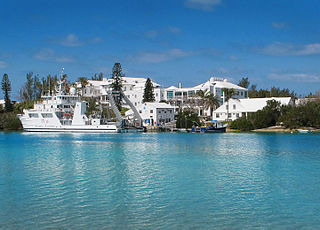
The Bermuda Institute of Ocean Sciences is an independent, non-profit marine science and education institute located in Ferry Reach, St. George's, Bermuda. The Institute, founded in 1903 as the Bermuda Biological Station, hosts a full-time faculty of oceanographers, biologists, and environmental scientists, graduate and undergraduate students, K-12 groups, and Road Scholar groups. BIOS's strategic mid-Atlantic Ocean location has at its doorstep a diverse marine environment, with close proximity to deep ocean as well as coral reef and near shore habitats.

The Scottish Association for Marine Science (SAMS) is one of Europe's leading marine science research organisations, one of the oldest oceanographic organisations in the world and is Scotland's largest and oldest independent marine science organisation.

The Extreme Ice Survey (EIS), based in Boulder, Colorado, uses time-lapse photography, conventional photography and video to document the effects of global warming on glacial ice. It is the most wide-ranging glacier study ever conducted using ground-based, real-time photography. Starting in 2007 the EIS team installed as many as 43 time-lapse cameras at a time at 18 glaciers in Greenland, Iceland, Alaska, Canada, the Nepalese Himalaya, and the Rocky Mountains of the U.S. The cameras shoot year-round, during daylight, at various rates. The team supplements the time-lapse record by occasionally repeating shots at fixed locations in Iceland, Bolivia, the Canadian province of British Columbia and the French and Swiss Alps. Collected images are being used for scientific evidence and as part of a global outreach campaign aimed at educating the public about the effects of climate change. EIS imagery has appeared in time-lapse videos displayed in the terminal at Denver International Airport; in media productions such as the 2009 NOVA Extreme Ice documentary on PBS; and is the focus of the feature-length film Chasing Ice, directed by Jeff Orlowski, which premiered at the Sundance film festival in Utah on January 23, 2012. Major findings were published in 2012 in Ice: Portraits of the World’s Vanishing Glaciers by James Balog.
Mark Dyurgerov was an internationally known glaciologist and Fellow of the Institute of Arctic and Alpine Research (INSTAAR) of the University of Colorado at Boulder. He was born in Moscow, Russia; both of his parents were engineers, and his mother was also a Russian poet.
Mark F. Meier was an American glaciologist who was considered a leading expert on the study of rising sea levels due to the melting of glaciers. Meier was the Director of the Institute of Arctic and Alpine Research (INSTAAR) from 1985 to 1994 and remained the institute's director emeritus until his death in 2012. He was also a professor of geological sciences at the University of Colorado Boulder.
Niwot Ridge is an alpine ecology research station located 65 km north-west of Denver in north-central Colorado. It is on the Front Range of the southern Rocky Mountains and lies within the Roosevelt National Forest. Niwot Ridge is 2,900 metres (9,500 ft) high.

Diane McKnight is a professor of civil, environmental, and architectural engineering at the University of Colorado Boulder and a fellow at the Institute of Arctic and Alpine Research (INSTAAR). McKnight is a founding principal investigator of the National Science Foundation's Long-Term Ecological Research (LTER) program in the McMurdo Dry Valleys of Antarctica.
John Thomas Andrews is a British-American geologist and professor emeritus of geological and atmospheric and oceanic sciences at the University of Colorado Boulder's Institute of Arctic and Alpine Research (INSTAAR), in Boulder, Colorado, USA.
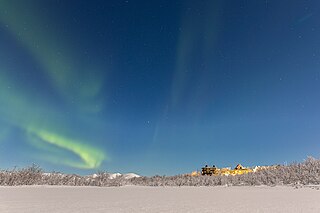
Climate Impacts Research Centre (CIRC) is a research institute based at the Department of ecology and environmental science (EMG) at Umeå University, Sweden, but primarily operative at Abisko Scientific Research Station which is run by the Swedish Polar Research Secretariat.
John Jay Kineman is an American physical scientist and theoretical ecologist, affiliated with the Cooperative Institute for Research in the Environmental Sciences (CIRES) at the University of Colorado Boulder, Past President of the International Society for the Systems Sciences (ISSS), and Fellow of the Sri Sathya Sai Center for Human Values in Puttaparthi, India; known for his work in the fields of Geographical information systems, ecological characterization, ecological niche modeling, Complex Systems Theory, and Vedic Studies.
Elisabeth Holland is an American climate scientist who focuses on how the carbon and nitrogen cycles interact with earth systems. She has become a key player in the international climate debate. She is currently a professor of climate change at the University of the South Pacific. She is also the director of the Pacific Center for Environmental and Sustainable Development.
Tania Schoennagel is an ecologist who specializes in wildfires and insect outbreaks. She is a research scientist at the University of Colorado, Boulder and has been involved with INSTAAR since 2011.
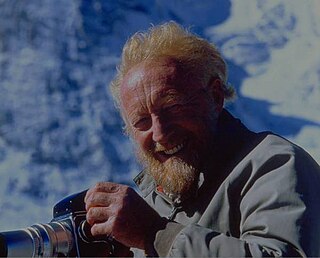
Jack D. Ives is a Canadian montologist, an Honorary Adjunct Research Professor of Geography and Environmental Studies at Carleton University in Ottawa, Ontario, Canada, an author, and a prominent advocate of mountain issues at the global level. He was formerly director of the Institute of Arctic and Alpine Research at the University of Colorado, Boulder, founding editor of two peer-reviewed journals, chair of the Commission on High Altitude Geoecology under the auspices of the International Geographical Union, and a senior advisor on mountain ecology and sustainable development for United Nations University.
Katharine Nash Suding is an American plant ecologist. Suding is a Distinguished Professor of ecology and evolutionary biology at the University of Colorado Boulder and a 2020 Professor of Distinction in the College of Arts and Sciences.
Merritt Turetsky is American ecosystem ecologist who is a professor at the University of Colorado Boulder. She serves as Director of the Institute for Arctic and Alpine Research (INSTAAR). Her research considers fire regimes, climate change and biogeochemical cycling in Arctic wetlands. Turetsky is a member of the Permafrost Action Team (SEARCH), a group of scientists who translate and deliver science to decision-makers.









